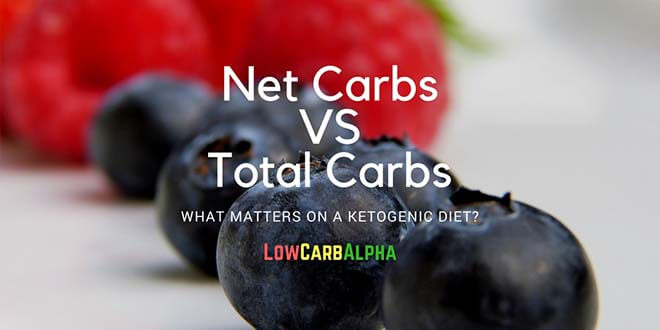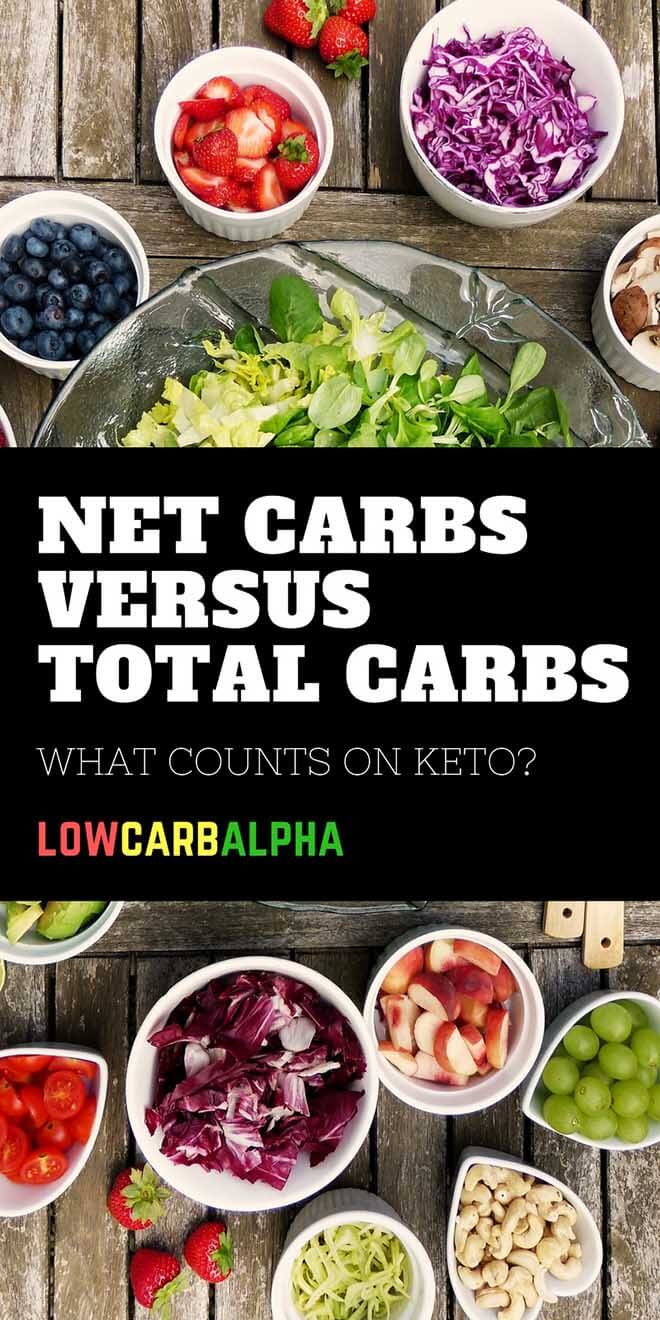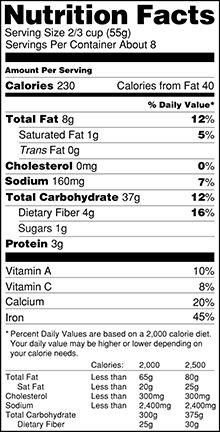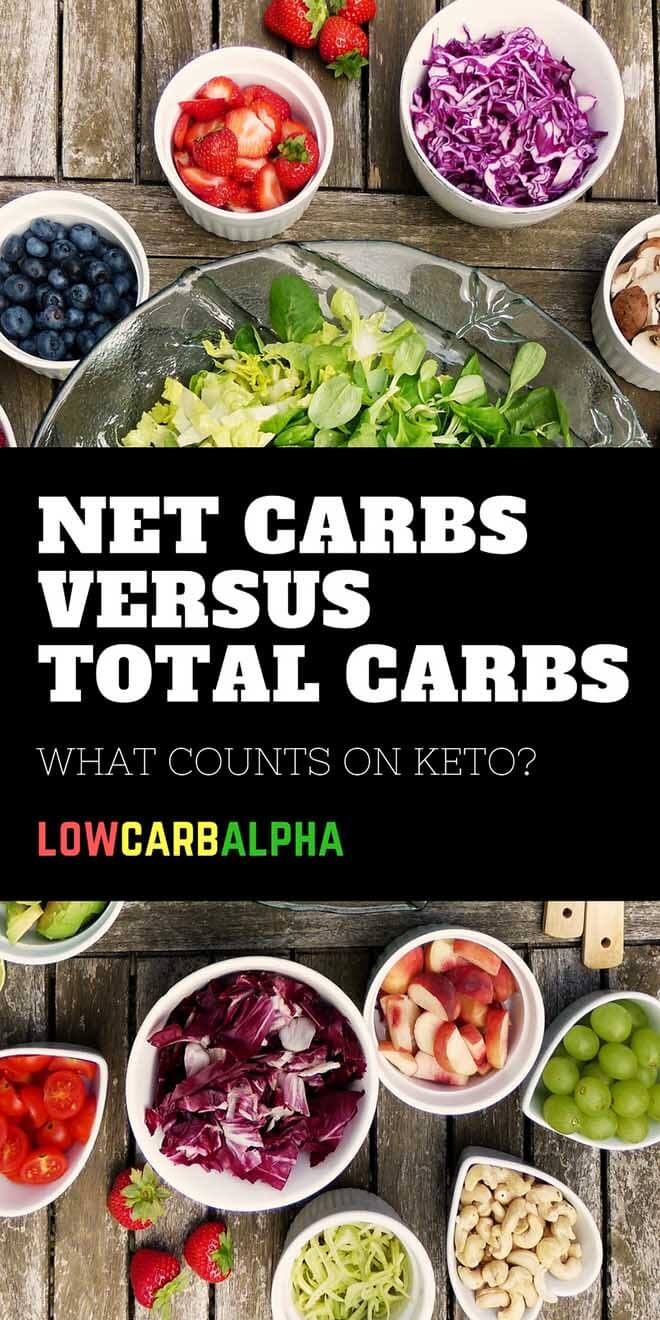
Trying to define the carbs on nutrition facts labels can be thoroughly difficult to understand.
There’s a figure for total carbs but also subheadings for dietary fiber, sugars, and sometimes sugar alcohols.
You may have heard questions people ask such as, “how many carbs should you eat daily?” and “should you count net carbs or total carbs?“.
Counting net or total carbs is a debatable topic with low carb dieters.
People have different reasons for counting macros, calories, and net carbs. Usually to increase health, fitness and try to drop some pounds.
People with diabetes particularly need to monitor carbohydrate intake.
Whatever your reason and whatever diet you follow, we aim to increase your knowledge of calculating net and total carbs.
Carbs For Health
Carbs are a complex thing in the low carb world. People say there good and bad, make you fat or thin, healthy and unhealthy, the list goes on.
For weight loss, it comes down to how soon your body can use the carbs.
The more simple the carb, the faster your body can convert it to energy and the more likely it can be an obstacle to losing belly fat.
The quick and simple carbs such as soda, white pasta, cereals, and rice produce insulin in the blood. You want to avoid these for sharp insulin spikes.
Carbs aren’t always bad if eaten in moderation along with a healthy diet of fruits and vegetables.
The acquired insulin spike isn’t inevitably a bad thing. It can effectively help power you through workouts, and even promote fat burning.

How your Body Manages Carbs and How Many To Eat?
The first thing you need to realize there is no such thing as essential carbs.
Your body uses essential fats and proteins but does not need any carbohydrates at all. You could even eat no fruits and vegetables and be ok.
Your body needs the smallest amount of glucose every day, and that is produced in the liver even if you don’t eat any carbs.
If you ever followed the Atkins diet, you’ll know 20g net carbs per day was your goal.
But bear in mind there are low carb dieters who dig into over 100g carbs per day, feel healthy and maintain their target weight.

It’s conceivable to lose weight too fast by while it also has the potential to plateau.
The optimal amount of carbs vary for everyone, but people with diabetes may find they do well on a low carb diet under 100g per day.
On low carb or keto dieting, you should eat 20g-50g of carbs per day either for weight loss or to maintain ketosis.
Whether you go by total carbs or net carbs depends.
What Are Net Carbs?
Sometimes mentioned as digestible carbs. Net carbs apply carbs which are digested in the body, including both simple and complex carbohydrates.
When you eat certain carbs, it’s developing into sugar by enzymes created in the small intestine and absorbed into the bloodstream. Your body can only absorb single sugar units.
Some carbs such as fiber and sugar alcohols cannot develop into individual sugars.
Your body uses fiber and sugar alcohol carbs in a different method rather than digestible carbs.
Fiber and sugar alcohols, therefore, can be subtracted from the total carbohydrates when counting net carbs.
Sugar Alcohol Effect on Carbs
Sugar substitutes such as Xylitol, Maltitol, Erythritol are treated similarly to fiber, with some significant exceptions.
They are commonly used in processed foods, including so-called healthy foods, meal replacements and more.
These sugar alcohols are only partly absorbed in the small intestine; some are only quickly assimilated into the bloodstream and then passed in the urine.
The effects on blood sugar and insulin levels vary, but all have a much lower effect than digesting sugar.

They can cause notable gastrointestinal issues such as bloating, wind, and loose stools and diarrhea in numerous people.
You’ll know the side effects if you’ve too ingested too much sugar alcohols.
Although they raise blood sugar, sugar alcohols don’t seem to have a significant effect on blood sugar and insulin levels.
People with diabetes or prediabetes should be particularly cautious but generally, everyone is different and the response your body gives you will vary.
Natural sweeteners such as erythritol and stevia seem to be the best choice for controlling blood sugar levels.
Should you Calculate Total or Net Carbs?
Each person must determine what process works best for them their goals.
Some people emphasize weight loss more quickly, others a somewhat slower approach.

People either want to have more carbs and want more fibrous vegetables while others find it difficult to give up the sweet desserts or fruit in general.
As long as you’re counting carbs and fiber, there is more chance of you hitting your macro targets, especially if eating whole natural foods.
The easiest way to know how carbs influence your ketone levels is to test either with a blood ketone monitor.
If you’re not noticing the results you wanted or expect to get from ketogenic dieting, estimate how many carbs you are getting.
Calculate exactly how many net carbs you are acquiring before you say the diet isn’t working for you.
How To Calculate Net Carbs
If you prefer to calculate net carbs, then it simply implies to assume the net quantity.
Since fiber is indigestible and passes through your body, it doesn’t need for calculating.
For example, if you take a packet of raw spinach it has a total of 10g carbs and 6g of fiber.
On the assumption, if you were calculating net carbs you would only figure 4 grams of carbs for the packet.
In another example from the nutrition facts label, there is 37g total carbohydrate, 4g dietary fiber, and 1g sugars. This would equal 33g net carbs in total.
If you didn’t remember to subtract the fiber from healthy foods such as nuts and seeds, for example, they would seem to have a greater carb content than some meals.
People count net carbs to ensure they get adequate fiber while eating low carb foods.
Fiber also helps to keep blood sugar stable and doesn’t negatively affect levels.
Conclusion
There is a much to ponder whether ketogenic dieting is best for you.
Don’t be put off be counting net carbs. At first, it’s a matter of experimentation to figure out what to eat, how much to eat and when to consume it.

Just remember to get the net carbs, you simply deduct the fiber from the total amount of carbohydrates.
People on a keto diet can eat all the fibrous carbs they require and not risk hurting their state of ketosis.
The calories from the carbs still count, but in general, fiber-carbs are safe, they burn slowly and won’t induce an insulin reaction.
While following a LCHF keto diet isn’t right for everyone it’s good for a majority of people out looking to improve health and reduce sugar intake.
But the most important to thing to remember is to eat clean, whole natural foods.
OnKeto.com is a news aggregation service that brings you best of world articles to you for your consumption.
Author: LowCarbAlpha
Author URL: https://lowcarbalpha.com/author/lowcarbalpha/
Original Article Location: https://lowcarbalpha.com/net-carbs-vs-total-carbs/
